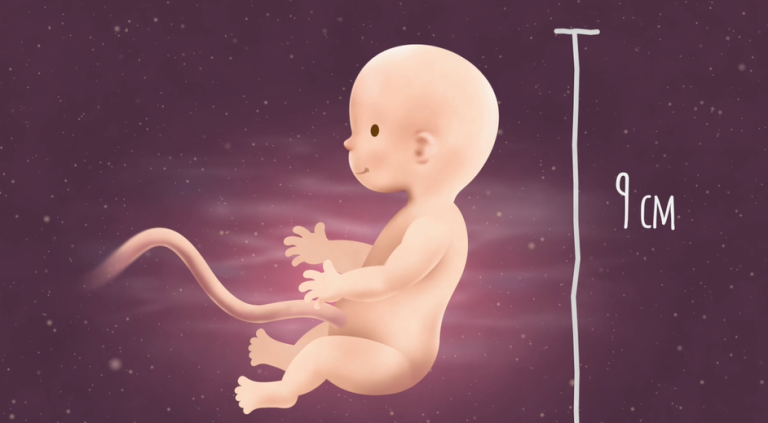Congratulations, you’ve already spent four weeks with your baby. Of course, you have probably just learned the wonderful news. While you didn’t even know you were pregnant, your baby has worked hard and grown and developed fast in the past three weeks. You can follow what has been happening in your body in the past weeks in our 1–2-week and 3-week pregnancy articles. But now, you are probably very excited and have hundreds of questions. Don’t worry. We will answer all of them. Let’s find out what awaits you and your baby at four weeks of pregnancy.
How Big Is My Baby?
This week the embryonic period begins. Your baby’s organs start to develop, and he uses all his energy to prepare a solid foundation for becoming a healthy baby. During the past three weeks, sperm cells struggled to fertilise the egg, and the fertilised egg cell managed to attach itself to the uterus. Your four-week-old baby is now connected to your uterus and is about the size of a poppy seed. It will still take some time before he looks like a baby. You’ll be able to see him in a few weeks, but you’ll have to wait a while for this happy moment.
Your Baby at Four Weeks
Last week, your baby was just a tiny ball of cells called a blastocyst. This week the embryonic period begins. Your little one develops into an embryo, and the placenta starts to form. The cells rapidly divide into several layers. In the coming weeks, these will gradually form the different parts of your baby’s body, nervous system, skeleton, organs, and skin. Another part of the blastocyst will form the placenta.
The placenta, which starts forming in the fourth week, is an amazing structure that facilitates the exchange between mother and baby and delivers nutrients and oxygen to the baby. But even before the placenta has fully developed, the baby is nourished well. This happens via the amniotic sac.
How Many Months Am I?
If you are four weeks pregnant, you are in the first month of your pregnancy. You are at the very beginning. There are exactly 36 weeks left until you will meet your baby!
Your Body at Four Weeks of Pregnancy
You are probably very excited as you just learned you are pregnant, and your mind is full of questions. Besides being curious about every detail of your baby’s development, you are probably also interested in the changes that your body is undergoing at four weeks.
One of the questions you probably wonder about is when you will start seeing your baby bump. As your baby is still tiny, you will have to wait a little longer for this exciting moment, typically until 16 and 20 weeks. You will, however, notice other changes and fourth-week pregnancy symptoms.
Fourth-Week Pregnancy Symptoms
You may have experienced some pregnancy symptoms in the past weeks already. These symptoms will increase during the fourth week because your pregnancy hormone levels are rising. Here are the main changes you may notice:
- Bloating
As your progesterone level rises, you may notice bloating. This common symptom will occur from time to time during pregnancy. You can prevent this discomfort by drinking plenty of water and paying attention to your diet.
- Mild cramping
At four weeks, you may worry when you feel cramps. There is usually no need to worry, as they are likely a sign that the baby is properly implanted in the uterus lining. However, contact your doctor if you experience intense cramps.
- Morning sickness
The hormones Beta HCG (Beta human chorionic gonadotropin) and oestrogen can cause nausea. As this nausea is usually experienced in the morning, this symptom is also called morning sickness. It usually peaks around the ninth week and then gradually improves. Morning sickness typically goes away completely in the second trimester.
- Breast tenderness
Your breasts may be tender and visibly swollen due to the hormones that prepare your body for your baby. This is good news as it indicates the activity of your milk ducts.
- Fatigue
During the fourth week of pregnancy, when that tiny ball of cells in your body turns into an embryo, the body is hard at work. This may cause you to feel quite tired.
- Mood Swings
Pregnancy is well-known for its mood swings caused by pregnancy hormones. You can feel this clearly at four weeks, and they may accompany you during the first twelve weeks.
Pregnancy Test at Four Weeks of Pregnancy
Your period is late, and you experience some pregnancy symptoms. Experiencing one or more symptoms does not necessarily mean you are pregnant. So, if you suspect that you are pregnant, it is best to do a pregnancy test.
This week, the hormone Beta HCG, known as the pregnancy hormone, reaches very high levels. At this point, a home pregnancy test, which tests the level of HCG in the urine, gives fairly accurate results. For the test result to be valid, you must check the expiration date of the pregnancy test. You are still likely to be pregnant when there is a line on the test strip, even if it is vague. If you want to be sure, you can repeat the test.
Doctor Check-Ups
If your pregnancy test at home indicates you are pregnant, it is good to have this confirmed by your doctor with a blood test. After your doctor has confirmed that you are pregnant, you can have your first examination, during which your doctor may examine the gestational sac with a vaginal ultrasound. He may also ask for a general blood test to detect nutritional deficiencies, check your thyroid function, and take a Pap smear. However, you still have to be a little patient before seeing your baby on the ultrasound, which is only possible after eight weeks.
Things to Pay Attention to from the Fourth Week of Pregnancy!
You received the good news and are probably very happy. However, you may need to make lifestyle changes to protect your health and your baby’s. This is the ideal moment to start! We will give you a few suggestions about what to be careful about.
- Closely Follow Up on Your Baby’s Development
It is important to follow up on your baby’s development carefully. Especially after the 12th week, you will frequently have a doctor’s check-up and see your baby via ultrasound. But even before this, you and your baby are undergoing many changes. Familiarising yourself with the different stages of pregnancy will help you follow up this process.
- Say Goodbye to Your Harmful Habits Now
Give up harmful habits as soon as possible. If you smoke, quit as soon as possible. Ask your doctor for advice. Also, insist that the people around you don’t smoke in your vicinity. Smoking causes a higher risk of miscarriage and premature birth and may lead to breathing problems in the baby. Strictly avoid drinking alcohol during pregnancy. Alcohol also increases the risk of premature birth and miscarriage, may cause developmental delays in the baby in the mother’s womb, and can even adversely affect the baby’s health after birth.
- Limit Caffeine Use
Caffeine should be limited during pregnancy. Too much caffeine affects your heart, circulatory and nervous system, and that of your baby as well. Babies have difficulty eliminating caffeine, which they take up from the placenta. Moreover, excess caffeine weakens iron absorption and may cause iron deficiency or anaemia in the mother, harming the baby’s development. Notice that caffeine is not just found in coffee. Tea, chocolate, cola, etc., also contain caffeine. Strictly limit these foods and drinks during pregnancy.
- Consume a Healthy Diet
During pregnancy, your body needs nutrients more than ever. A healthy diet is crucial as your baby is directly affected by what you eat. By ensuring an adequate intake of vitamins and minerals, you lay the foundations of a problem-free pregnancy and ensure the healthy development of your baby. This is already important during the fourth week, as your baby turns into an embryo and is developing rapidly. Include different types of foods in your diet, such as vitamin-rich fruits and vegetables, protein heroes like red and white meat and fish and dairy products, which are important sources of calcium.
Don’t forget about eating enough complex carbohydrates to give your baby plenty of energy. And make sure to consume iron-rich foods and foods that increase iron absorption, such as citrus fruits.
- It’s Folic Acid Time!
A sufficient intake of folic acid, especially during the first 12 weeks of pregnancy, supports the healthy development of your baby’s brain, nervous system, and spinal cord. Moreover, it helps prevent issues such as neural tube defect (NTD), which is a not very common but serious defect in the nervous system. Make sure to eat plenty of folic acid-rich foods, such as legumes, citrus fruits, leafy greens, hazelnuts, broccoli, Brussels sprouts, avocados, and bananas. Additionally, your doctor may prescribe a folic acid supplement, which you should take regularly.
- Pay Attention to Medication Use
Especially during the first trimester, you should be careful about using medications. Certain medicines can harm both mother and baby. Only take drugs, even over-the-counter ones, under the supervision of a doctor. If you have a chronic illness for which you take regular medications, you should discuss this with your doctor.
- Avoid Harmful Chemicals
Your body is very sensitive now. You probably noticed this in the form of nauseous reactions to strong smells. Chemicals adversely not only impact how you feel but also affect your entire body and your baby’s development. Avoid cleaning products such as bleach, chemical skin care products, perfumes, etc. Also, it may be best to postpone dying your hair, as hair dye contains certain chemicals that may harm your baby.
- Keep Moving
Your body hasn’t got heavy yet, and you are not experiencing any movement restrictions for now, but it is best to avoid heavy exercise during this period. At the same time, it is important to keep moving, as this has many benefits, such as improving mental health, stimulating blood circulation and strengthening your overall physical health. You can take walks and do light exercises, like stretching and strengthening your spine.
- Consume Plenty of Water
Consumption of water helps prevent digestive problems, skin issues, nausea and early contractions, which you may experience now or later. Water is extremely important for the cell structure of the baby, as well as for the amniotic fluid in which he lives. Therefore, daily water consumption during pregnancy should not be less than 3-3.5 litres.
Creative Ways to Tell Your Partner About Your Pregnancy
You are living the first days of one of the most extraordinary periods in your life, and you’ll want to share this sacred feeling with your loved ones, especially with your partner. We have some suggestions to make the moment of breaking this wonderful news extra special.
- Turn his morning into an unforgettable moment and wake him up by saying, “Good morning, daddy!” He will start his day full of surprise and excitement. Avoid announcing the news just before sleep. This sweet news should be savoured throughout the day.
- Give your partner a gift box with a pregnancy card, a baby photo or baby shoes inside.
- You can also wait for your first examination to break the news and surprise your partner with the ultrasound image of your baby, together with a sweet note like “Hello, daddy, let’s meet!”
- Break the news during a romantic dinner. Inside the menu, you can leave a photo of the ultrasound or a note saying you are pregnant.
- No matter how you present the news, be sure to record this wonderful moment on video, so you can remember it for life and share it with your little one when he grows up.
The fourth week of pregnancy is very exciting for you and a period of active development for your baby. While supporting his healthy growth, remember to take care of yourself and enjoy this process to the fullest!







